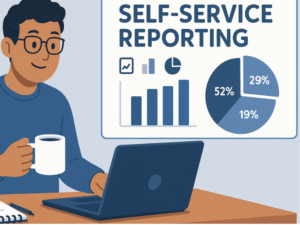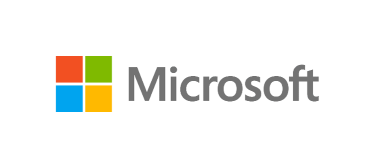Craig Bryden – Principal Consultant @ Advanced Data & AI Company.
TL;DR
Governed Self-Service reporting, when implemented correctly, is of great value to an organisation and is much more economical to implement today than it was 5+ years ago. The benefits include cost savings, improved productivity, improved decision making, and user satisfaction.
Introduction
In today’s fast-paced business environment, the need for timely and accurate data is paramount. Self-service reporting has emerged as a powerful tool that enables business users to generate reports and insights without relying heavily on the IT department. Tools like Power BI have revolutionized how companies handle and visualize data, making it more accessible and actionable for everyone within the organization. This article will explore the benefits and challenges of self-service reporting and governed self-service reporting.
Benefits of Self-Service Reporting
Self-service reporting allows business users to create their reports quickly without waiting for IT. This agility enables faster decision-making and responsiveness to market changes, fostering a more dynamic business environment.
With self-service reporting, employees across various departments can access and analyse data relevant to their roles. This empowerment leads to better insights and a more data-driven culture within the organization.
Reducing the dependency on a single person or even an IT department for report generation improves efficiency and can lead to significant cost savings. This frees up IT resources to be redirected to more strategic initiatives rather than being bogged down with routine reporting tasks. The removing of dependency will improve the productivity of the business users and the traditional report creators.
Business users can customize reports to meet their specific needs, leading to more relevant and actionable insights. This flexibility allows for more nuanced analysis and better alignment with business goals.
Benefits of Governed Self-Service Reporting
Governed self-service reporting ensures that the data being used is accurate and consistent across the organization. This governance reduces the risk of errors and discrepancies, providing a single source of truth for all users.
Implementing governance frameworks helps in maintaining data security and compliance with regulatory requirements. It ensures that sensitive data is protected and only accessible to authorized users.
Governance processes help in maintaining higher data quality by establishing standards and protocols for data entry, transformation, and reporting. This improvement leads to more reliable and trustworthy insights.
With governed self-service reporting, different departments can collaborate more effectively, knowing that they are working with the same accurate and reliable data. This collaboration fosters a more cohesive and efficient working environment.
The good news is that, while utilising modern platforms such as Power BI and Microsoft Fabric, your organisation can implement a governed self-service reporting platform for a significantly lower price point than was possible just 5 years ago.
Challenges in Implementing Self-Service Reporting
One of the significant challenges in implementing self-service reporting is dealing with data silos. Ensuring seamless integration of various data sources can be complex and time-consuming. Companies need to establish robust data integration practices to overcome this hurdle.
For self-service reporting to be effective, users must be adequately trained on how to use the approved reporting platforms and understand the data they are working with. Encouraging adoption and providing continuous training is crucial for success.
While self-service reporting offers flexibility, it can also lead to inconsistencies and errors if not properly governed. Implementing a robust data governance framework is essential to ensure data accuracy and reliability. This includes a separation of duties between those that ingest and prepare the data, and those that consume that data.
As the organization grows, the volume and complexity of data will increase. Ensuring that the data platform can scale to meet these growing demands requires careful planning and resource allocation.
Conclusion
Self-service reporting and governed self-service reporting offer significant benefits in terms of agility, cost savings, and empowerment of business users. However, implementing these practices comes with its challenges. By addressing issues such as data integration, user training, governance, scalability, and cost management, companies can harness the full potential of self-service reporting to drive better decision-making and business outcomes.
If you need help with your self-service reporting strategy or implementation, we at Advanced Data & AI Company are the partner you are looking for. Contact us so that we can show you how we can ensure your success in your data analytics and AI journey.




